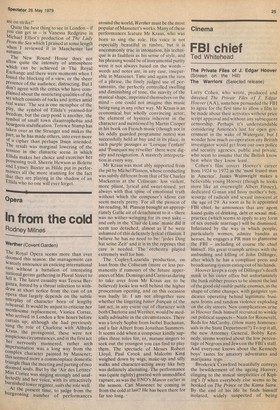In from the cold
Rodney Milnes
Werther (Covent Garden) The Royal Opera seems more than ever doomed this season: the management can scarcely announce an enticing international cast without a battalion of interesting national germs gathering in Floral Street to fell it. The latest casualty was Teresa Berganza, forced by a throat infection to withdraw at short notice from the cast of an Opera that largely depends on the subtle interplay of character born of lengthy rehearsal. It would be unjust to criticize her mettlesome replacement, Viorica Cortez, Who arrived in London a few hours before curtain up; although she had previously sung the role of Charlotte with Alfredo Kraus, the protagonist, these were not auspicious circumstances, and in the first act her nervously mannered, rather arch impersonation was a long way from the complex character painted by Massenet; this seemed more a commonplace domestic triangle than the meeting and parting of two doomed souls. But by the 'Air des Lettres' Miss Cortez was singing strongly and unaffectedly and her voice, with its attractively burnished lower register, suits the role well. At the present time, to judge from the burgeoning number of performances around the world, Werther must be the most popular of Massenet's works. Many of these performances feature Mr Kraus, who was born to sing the role. His voice is not especially beautiful in timbre, but it is uncommonly true in intonation, his techni que is as faultless as his sense of style, and his phrasing would be of instrumental purity were it not always based on the words — words and notes are, in any case, inseparable in Massenet. Time and again the turn of a phrase, the finely judged use of portamento, the perfectly controlled swelling and diminishing of tone, the suavity of the musical shape, imprinted themselves on the mind — one could not imagine this music being sung in any other way. Mr Kraus is an economical but wholly convincing actor; the element of hysteria inherent in the character and mentioned by Martin Cooper in his book on French music (though not in his oddly guarded programme notes) was successfully held at bay and in its place, in such purple passages as Torsque l'enfant' and `Pourquoi me reveiller' there were dignity and resignation. A masterly interpretation in every way.
Mr Kraus was most ably supported from the pit by Michel Plasson, whose conducting was subtly different from that of Sir Charles Mackerras at the Coliseum: less violent, more pliant, lyrical and sweet-toned, yet always with that spine of emotional truth without which the composer's idiom can seem merely pretty. For all the passion of his reading, M. Plasson brought an appropriately Gallic air of detachment to it — there was no wither-wringing for its own sake — and only.in the 'Clair de Lune' music did it seem too detached, almost as if he were ashamed of this delicately lyrical effusion. I believe he has no need to be: ledes Ding hat seine Zeit' and it is in the reprises that care is needed. The orchestra played extremely well for him.
The Copley/Lazaridis production, on loan from the Coliseum (more or less permanently if rumours of the future apperances of Mm. Domingo and Carreras daring to take over from Mr Kraus are to be believed) looks less well behind the higher proscenium opening, and on this occasion was badly lit. I am not altogether sure whether the lingering baiser francais of the last act, in any event out of character with both Charlotte and Werther, would be medically advisable in the circumstances. There was a lovely Sophie from Isobel Buchanan, and a fair Albert from Jonathan Summers. It seems odd when a composer kindly supplies three roles for, er, mature singers to seek out the youngest you can find to play them. The spectacle of Messrs Robert Lloyd, Paul Crook and Malcolm King weighed down by wigs, make-up and silly walks and character-acting away like fury was definitely alienating. The performance was (quite rightly) greeted with unmodified rapture, as was the ENO's Manon earlier in the season. Can Massenet be coming in from the cold at last? He has been there for far too long. •


































 Previous page
Previous page